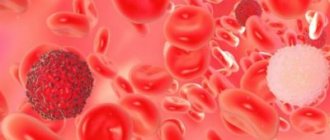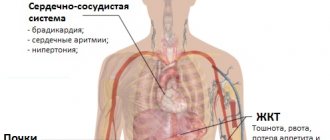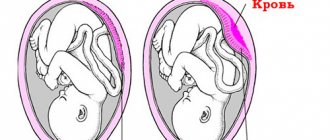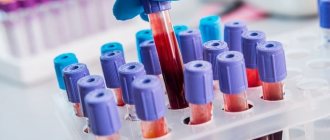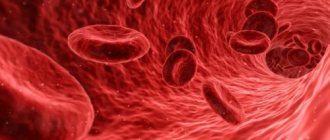What does ionized calcium indicate?
Normally, the amount of free (ionized) calcium is from forty-three to fifty percent of the total calcium reserves in the blood.
Blood calcium levels vary at different times of the day. The minimum level of ionized calcium is observed at eight o'clock in the evening, and the maximum at two to four o'clock in the morning.
The level of free calcium in the blood is maintained by the secretion of parathyroid hormone, calcitonin and vitamin D3 (its active form). At the same time, the level of these hormones and vitamin D3 also directly depends on the level of ionized calcium.
In addition, various proteins and magnesium affect calcium levels. In this regard, if a low level of ionized calcium is detected, a comprehensive examination is required, including an assessment of the level of magnesium, albumin, parathyroid hormone, etc.
Also, the ABS (acid-base state) of the blood has a significant effect on the level of ionized calcium in the blood. With alkalosis, there is a decrease in calcium levels (due to its binding), and with acidosis, on the contrary, an increase in the concentration of free calcium.
In this regard, the analysis of ionized calcium is more accurate and informative than the determination of the total calcium level.
The analysis is especially important for patients before planned surgical interventions, undergoing treatment in intensive care, persons receiving therapy with bicarbonates, heparin, calcium supplements, magnesia, etc.
Also, the analysis for ionized calcium is more informative than assessing the level of total calcium in primary hyperparathyroidism, in which there is an increase in free calcium, without an increase in the level of total blood calcium.
Analysis of the level of ionized calcium also plays an important role during pregnancy. Normally, women carrying a child experience a moderate decrease in the level of total calcium (the decrease in calcium is directly proportional to the decrease in albumin levels), while the level of free calcium should remain within normal values.
In the fetus, the level of free total Ca fractions is slightly increased, however, during the first days of life, the Ca level decreases to normal values.
How much calcium should you consume per day?
In order for calcium in the blood to be maintained at normal levels, it should be consumed daily in sufficient quantities. If the mineral enters the body in small quantities, the condition will begin to deteriorate, and children will experience impaired physical development. The recommended calcium intake per day by age is:
- Children up to six months of age – 200 mg.
- Children aged from six months to 1 year – 400 mg.
- Children aged 1 to 4 years – 600 mg.
- Children from 4 years to 11 years – 1000 mg.
- Adolescence from 11 to 17 years - 1200 mg.
- Adults from 17 to 50 years – 100 mg.
- Men aged 50 to 70 years – 1200 mg.
- Women aged 50 to 70 years – 1400 mg.
- Persons over 70 years old – 1300 mg.
The daily norm for women carrying a child and breastfeeding increases significantly and amounts to 1500 mg of calcium.
The role of calcium in the body
Those who do not know the intricacies of human physiology and anatomy believe that calcium performs only one function for the body - it provides strength to our bones and teeth. However, this judgment is incorrect! This essential chemical element is involved in cardiac activity, that is, the contraction of the atria and ventricles, and also plays an important role in the hemostasis and neurohumoral system. In addition, without it many metabolic processes would be impossible.
The adult body contains approximately 1–1.5 kg of calcium, with only 1% circulating in the blood, while the remaining 99% is distributed in the bone structures. The total reserve of this element in the human body is about 2% of the total body weight of a particular individual, which is tens of times higher than the content of all other individual electrolytes.
Calcium, located in bone tissue, does not participate in metabolic processes, that is, only 1% of the component is involved in metabolism. In the blood, the element is present in three forms - one physiologically active and two inactive. The first is ionized free Ca, accounting for approximately 55% of the total amount dissolved in the blood.
The rest is inactive (not ionized), and consists of compounds with low molecular weight anions ((bicarbonate, lactate, phosphate, etc.) 10%) and proteins, mainly albumin (35%). In addition to the functions described above, the element also maintains normal muscle contractility, stimulates the production of a large number of enzymes and is involved in iron metabolism.
It produces cardiac activity along with magnesium, and the strength of bone tissue and teeth is maintained through the interaction of calcium and phosphorus. Without the assistance of this element, the formation of a thrombotic clot, which is the borderline stage in the conversion of prothrombin into thrombin, would be impossible. That is, in other words, if there is a lack of Ca in the blood, then the hemostasis system cannot function sufficiently.
It is an indispensable component of the adequate performance of the endocrine glands; for example, in the absence of calcium or its deficiency, the parathyroid glands are not able to fully carry out their function. The element plays an important role in the mechanisms of cellular reception, providing information exchange between cells.
A priori, a person cannot be considered healthy if there is a lack of Ca in the body, since without it, high-quality and complete sleep is absolutely impossible. That is why determining the calcium content in the blood is often used to diagnose various pathologies.
Why is calcium needed in the blood?
The amount of calcium in the blood is only 1% of the total concentration of this mineral in the body. The bulk of calcium comes from bones and tooth enamel.
The presence of calcium in the blood is necessary, since it is involved in many processes and can only be carried throughout the body through the bloodstream. Without this mineral, the following processes are impossible in the body:
- muscle contraction,
- activation of enzymes (enzymes),
- work of the endocrine glands,
- transmission of nerve impulses,
- regulation of cell membrane permeability,
- blood clotting,
- renewal of joint tissue,
- activation of hormones,
- normal functioning of the endocrine glands,
- cellular reception,
- dream.
The beneficial properties of the mineral in the body appear only if calcium in the blood is normal. When it is violated, pathological conditions develop that require mandatory therapy, without which many pathological processes will develop.
What does high and low blood calcium levels mean?
Excess Ca levels in the blood occur due to:
- thyroid diseases;
- excess vitamin D;
- excessive consumption of foods rich in calcium;
- metabolic disorders;
- kidney diseases;
- existing chronic pathologies;
- the presence of malignant tumors;
- lack of gastric juice;
- physical inactivity.
An increase in Ca is manifested by the following symptoms:
- weakness and drowsiness;
- feeling of nausea and vomiting;
- constant thirst;
- heart failure;
- pain in the area of the kidneys and stomach;
- a feeling of sore bones and frequent headaches.
Hypocalcemia - low Ca in the blood. Test results will show low levels of Ca in the blood if a person:
- suffers from pancreatitis, osteomalacia rickets;
- suffers from diseases of the liver and biliary systems;
- takes anticonvulsants.
In this case, the following symptoms are observed:
- the nervous system is often excited;
- facial muscles become numb;
- cramps in the abdominal area;
- heart rhythm is disturbed;
- fingers tremble.
To restore calcium balance, you need to eat right
It is worth paying special attention to: dairy products, legumes, nuts and seeds, vegetables and fruits, herbs, salmon fish and sardines, vegetable oil, chocolate, cocoa, bran bread, eggs, sesame grains
Blood calcium is elevated, other tests have been taken, how to decipher them
Of course, deciphering a blood test is the prerogative of the attending endocrinologist, and independent study of one’s blood test can lead the patient to diagnostic errors, however, within the framework of this article we will give some information about the possible results of a laboratory examination for elevated blood calcium
Use the data obtained with caution and remember that they do not replace consultation with a specialist doctor. So, possible options for laboratory results and their interpretation
So, possible options for laboratory results and their interpretation.
Blood calcium is increased, parathyroid hormone is increased, phosphorus is decreased, calcitonin is normal, calcium in daily urine is increased
– most likely, we are talking about primary hyperparathyroidism and the presence of a parathyroid adenoma. Additional examination is necessary using ultrasound of the thyroid gland and neck, scintigraphy of the parathyroid glands with technetril, and in some cases, computed tomography of the neck. It is treated surgically (endoscopic surgery through an incision about 2 cm long is possible in a specialized center).
Parathyroid hormone is elevated, calcium is normal, phosphorus is normal, calcitonin is normal - with a high degree of probability we are talking about secondary hyperparathyroidism due to a banal deficiency of vitamin D in the blood. Treated with vitamin D and calcium
It is important to exclude a laboratory error associated with an underestimation of the level of ionized calcium in the blood (it is better to retake the test for ionized calcium in a specialized laboratory of the endocrinology center).
Calcium in the blood is increased, parathyroid hormone is normal, phosphorus is normal, calcitonin is normal
– a neuroendocrine tumor that produces PTH-like peptides or forms lytic metastases in the bone should be suspected. Examination and treatment depend on the type of tumor detected.
High calcium in the blood (usually slightly increased calcium is observed), parathyroid hormone is moderately increased, phosphorus is normal, calcitonin is normal, calcium concentration in daily urine is reduced
– we can talk about a rare familial disease, the so-called familial benign hypocalciuric hypercalcemia. This disease is accompanied by a change in the sensitivity of cellular receptors to parathyroid hormone and impaired calcium excretion in the urine. Does not require treatment and is not dangerous. Often, inexperienced doctors diagnose primary hyperparathyroidism in such cases and refer the patient to unnecessary surgery to remove a non-existent parathyroid adenoma.
Ionized calcium is increased, total calcium is normal, parathyroid hormone is increased
– we are usually talking about parathyroid adenoma.
Ionized calcium is elevated, total calcium is below normal
– laboratory error must be excluded. The analysis should be re-taken in a specialized laboratory.
Ionized calcium in the blood is increased, parathyroid hormone is increased, calcitonin is increased
– the patient should be suspected of having both a parathyroid adenoma and medullary thyroid cancer. Together, these two diseases indicate a high probability that the patient has type IIA multiple endocrine neoplasia syndrome - a rare hereditary pathology transmitted in the family and leading to the development of three dangerous tumors: medullary thyroid cancer, parathyroid adenomas (usually multiple), pheochromocytoma (tumor adrenal gland, which produces adrenaline or norepinephrine). Urgent consultation with an endocrinologist or endocrinologist surgeon is required!
Calcium in the blood is elevated during the first test, I want to retake the test - what is the best way to do this?
If you want to check whether your blood calcium is really elevated and are going to take a second blood test, follow some important rules that will help the second test be as accurate as possible:
1. a blood test should be taken only in a specialized laboratory using high-quality equipment;
2. a blood test must be taken only on an empty stomach;
3. if you are taking vitamin D or calcium supplements (or combination medications with vitamin D and calcium), stop them at least 2-3 days before your blood test; the entry of calcium from the drug into the blood can lead to an increased calcium level in the blood - of course, in this case a falsely elevated calcium is detected.
Causes of decreased calcium levels in the blood
Hypocalcemia is the scientific name for a condition characterized by low levels of calcium in the blood. Most often, its fall is caused by a decrease in the level of albumin (a protein component of blood). In this case, there is a deficiency of only protein-bound calcium, and ionized calcium will remain within normal limits.
Other reasons that can lead to hypocalcemia:
- Malfunction of the parathyroid glands, release of parathyroid hormone into the blood.
- Absence of parathyroid glands as a result of the operation.
- Lack of vitamin D.
- Chronic renal failure, nephritis.
- Spasmophilia and rickets in a child.
- Acute magnesium deficiency in the human body.
- The body's immunity to the effects of parathyroid hormone, caused by congenital developmental anomalies.
- Low calcium content in food consumed by a person.
- High levels of phosphates in the blood.
- Severe diarrhea.
- Serious liver damage (cirrhosis).
- The presence in the body of osteoblastic metastases, which require a lot of calcium to continue their pathological growth.
- Hyperplastic changes in adrenal tissue.
- Taking medications to treat epilepsy.
- Transfusion of impressive volumes of blood, which contains citrate.
- Alkalosis in the acute phase.
- Diseases such as: alcoholism, acute pancreatitis, colitis. They are combined into one group, since each of them does not allow calcium to be normally absorbed into the blood from the gastrointestinal tract.
When is a calcium level test necessary?
A blood calcium test is ordered by a doctor if there is a suspicion of hypercalcemia (excessive amounts) or hypocalcemia (insufficient amounts). It is necessary to take an analysis in the following cases:
- pain in the bones,
- muscle diseases,
- muscle cramps,
- loss of sensation in the limbs,
- insomnia,
- excessive urination,
- pathological nervous excitability,
- hyperthyroidism,
- urolithiasis disease,
- bone tuberculosis,
- general exhaustion of the body,
- liver failure,
- extensive injuries,
- extensive burns,
- systemic inflammatory diseases,
- carrying out hemodialysis,
- suspicion of osteoporosis,
- pathological changes in the state of the cardiovascular system,
- pathologies of the gastrointestinal tract,
- cancer diseases,
- general examination before surgery.
The level of calcium is detected in the blood serum by conducting a test for ionized calcium or total calcium. The first method is more complex, but also more accurate, although general analysis almost always gives a good result. Deciphering the analysis is not difficult for a doctor.
How to fix a deficiency
First of all, you should start adjusting your diet. Remember that you really need vitamins, be sure to add vitamins D and C to your diet. Vitamin D will help the proper absorption of calcium in the patient’s intestines, and vitamin C will then help quickly absorb into the blood what the body was able to receive. However, both of these vitamins themselves have very important functions - they fight fungal viruses and maintain the correct balance. How can you diversify your diet to add calcium? Be sure to include milk of varying degrees of “seasoning”, for example, combine cheeses with milk, buy yoghurts. Fish products, both the fish itself and caviar, are very important things in your diet. Be sure to add vegetables, broccoli, cabbage, turnips. You shouldn’t make a face - it’s better to come to terms with the inevitable and learn how to cook them tasty and varied.
Remember that you should take any medications only as directed by your doctor. Moreover, it is very difficult for the average person to understand among the diversity - where are the good vitamins and where is the deception. Listen carefully to your doctor's recommendations and follow them without self-medicating.
Reasons for the increase
An increase in calcium levels in the body is called hypercalcemia.
This condition usually occurs after prolonged use in the diet of a large number of products containing this microelement, with the abuse of biological additives, uncontrolled use of certain medications (in particular, drugs for the treatment of peptic ulcers), and radiation therapy.
In addition, there are a number of genetic pathologies that lead to impaired absorption of calcium, and, as a result, to hypercalcemia.
Symptoms of calcium excess include:
- disorders of the gastrointestinal tract (loss of appetite, nausea, vomiting, frequent constipation);
- arrhythmia, cardiovascular system failures;
- deterioration in general health, weakness;
- pathology of the urinary system;
- psycho-emotional disorders up to hallucinations.
The danger of this condition is that calcium tends to accumulate in tissues and organs, which causes multiple disruptions to their functioning.
Thus, when microelements are deposited in the kidneys, urolithiasis develops, and its deposition on the walls of blood vessels can lead to a decrease in their lumen.
With hypercalcemia, excess calcium is excreted from the body quite poorly, so appropriate treatment is indicated. It consists of following a diet low in this microelement, taking diuretics and other medications prescribed by the attending physician.
In men, hypercalcemia occurs with malignant prostate tumors, so if symptoms of calcium excess develop, you should consult a urologist and surgeon.
Treatment
Before starting treatment, it is necessary to establish an accurate diagnosis, for which a blood test is taken from the patient.
Indications for calcium testing are:
- symptoms of low or excess substance;
- cancer;
- gastrointestinal pathologies;
- preoperative period;
- muscle and bone pain, patient weakness;
- convulsions;
- diseases of the cardiovascular system;
- loss of sensation;
- drop in protein concentration in blood samples;
- problems of the excretory organs.
So, ionized calcium is low - what to do?
The main way to cure calcium deficiency is to compensate for the lack of the substance.
For this purpose, intravenous administration of a solution of calcium chloride, as well as lactate and gluconate, can be used in patients with an established diagnosis in a hospital setting. Ascorbic acid and, to compensate for hypomagnesemia, magnesium sulfate can be added to the solution.
At home, with a relatively mild course of the disease and an established diagnosis, powder forms of the mentioned medications can be used for oral use.
In addition to medications, the patient needs to adjust the diet towards foods containing calcium and vitamin D:
- hard cheeses;
- sardines;
- dried apricots;
- dairy products;
- sesame;
- soy;
- almond;
- celery.
When is a potassium test performed?
The need for research is determined by a doctor: therapist, nephrologist, cardiologist, nutritionist or traumatologist. Indications for prescribing a biochemical blood test for potassium:
- suspicion of a pathology that is associated with a deficiency or excess of a macronutrient in the body;
- the need to assess electrolyte balance during treatment with diuretics or cardiac drugs;
- heart rhythm disturbances;
- tremor of the limbs;
- diseases of the thyroid gland and adrenal glands;
- The patient has persistently high blood pressure.
The test is also performed if a person has symptoms of high or low potassium. Symptoms of increase include: increased excitability, digestive disorders, cardiac arrhythmia and convulsions.
A reduced macronutrient content is accompanied by general weakness, increased thirst, weight loss, slower reflex activity, decreased blood pressure and a frequent urge to urinate.
Preparation for the study consists of fasting for at least 8 hours and no more than 14. The day before, fatty, highly salted and smoked foods that create food overload should be excluded from the diet. Unsweetened and still water can be drunk in any quantity. Since some medications have a direct effect on the indicator, they should also be excluded for 24-72 hours with prior agreement with the attending physician.
Calcium during pregnancy
The daily calcium requirement during pregnancy is 1000 - 1200 mg. A lack of calcium can lead to the “leaching” of calcium from the bones and teeth of the expectant mother, which subsequently leads to dental problems and the early development of osteoporosis. The lack of calcium during pregnancy can only be compensated by consuming dairy products, since the calcium content in products of other categories is several times lower.
In order for the child to receive calcium in normal quantities, the pregnant woman must also take vitamin complexes for pregnant women recommended by the gynecologist throughout pregnancy and during breastfeeding.
It is easy to assess the calcium content in a pregnant woman’s diet if she keeps a food diary. But the easiest way is to do a calcium test - take a biochemical blood test for microelement composition.
The most important substance for the body
Calcium is involved in the functioning of all organs and systems of the human body. Most of it is found in the tissues of bones and teeth. Approximately 2% contains nerve fibers, blood and muscles.
There is an active and inactive form of this element. In the active form, 50% of ionized calcium is active, and the remaining 50% is inactive:
- lactate,
- phosphate,
- carbonate.
For the female body, calcium is the most important substance. The strength of bones, nails, and teeth depends on it. With insufficient calcium, the nervous and cardiovascular systems cannot function normally. He:
- provides the ability to contract muscles,
- participates in the processes of blood clotting and iron metabolism,
- normalizes the function of the endocrine system,
- maintains the strength of vessel walls.
The required amount of calcium in the blood prevents bone fragility and the threat of osteoporosis. This danger for women especially occurs during the period after menopause. Lack of calcium is directly related to negative symptoms during the premenstrual period.
Kidney function and blood pressure may worsen due to calcium deficiency. Pregnant women may experience premature labor or stillbirth. Calcium helps the heart muscle contract. The risk of cardiovascular disease is reduced. Calcium is involved in the production of hormones for lipid synthesis, thereby affecting a woman’s metabolism and weight.
The processes of hematopoiesis and metabolism depend on the calcium content. It is involved in the formation of bone tissue, fights inflammatory processes, allergic reactions and radiation.
The negative effect of calcium is that it interferes with the absorption of iron and zinc; excessive amounts of it provoke constipation and contribute to the development of urolithiasis and prostate cancer.
Calcium absorption occurs in the duodenum and small intestine. A normal amount of calcium is absorbed from receptors only in the small intestine. If the norm is exceeded, then the work of the duodenum and intercellular mechanisms is activated.
Norm
The degree of saturation of blood serum with ionized calcium is determined by age.
Table of active calcium content.
| Age | Content mmol/l |
| Newborns | 1,05-1,38 |
| Children from 1 year to 16 years | 1,29-1,33 |
| Adults | 1,17-1,31 |
During pregnancy, total calcium decreases due to a decrease in protein content, and active calcium levels should remain within the physiological range.
A decrease in ionized calcium to 0.8 mmol/l provokes tetany (muscle convulsive readiness) and convulsions. A drop in its level to 0.5-0.7 mmol/l poses a threat to life.
Reduced rate
Calcium deficiency may also indicate the development of certain pathologies in the body. Ionized calcium in the blood is reduced in the following diseases:
- Infectious diseases.
- Lack of vitamin D or magnesium.
- Kidney pathologies.
- Diseases of the pancreas.
- Endocrine diseases.
- Gastrointestinal diseases.
- Postoperative period.
Low Ca is often observed in menopausal women after 50 years of age. This is due to hormonal changes in the body. Also, the leaching of Ca from the body can occur while taking diuretics, with the abuse of salty foods; a decrease in calcium in the blood in women can occur during pregnancy and an unbalanced diet.
Symptoms that ionized calcium is greatly reduced include the following conditions:
- Destruction of teeth and nails.
- Dry skin.
- Hair fragility.
- Tachycardia.
- Slow blood clotting.
- Nervous excitability.
- Dizziness.
- Headaches and muscle pain.
- Brittle bones.
Treatment for Ca deficiency depends on the causes of the abnormalities. During complex therapy, patients may be prescribed a special diet or vitamin preparations that compensate for the deficiency of the element in the body. It is worth noting that girls who abuse diets for weight loss often suffer from a deficiency of free calcium in the blood.
Normal limits in blood
For each age category, there are restrictions on the content of calcium ions in the blood. Minor deviations are possible. The rest speaks of pathology.
The norm is presented in the following table:
| Person's age | Ca values (mmol/l) |
| In children under one year of age | from 1.2 to 1.37 |
| In children under 14 years of age | from 1.28 to 1.32 |
| In adults | from 1.16 to 1.3 |
For women and men, the normal parameters are the same . But during pregnancy, a woman’s need for calcium increases significantly. To regulate its level, special drugs are prescribed.
Causes and danger of deviation from the norm
Calcium levels can be either low or high. The reason for the decrease is:
- poor nutrition - most often, a deficiency of this microelement is caused by strict diets, especially vegan ones, which prohibit the inclusion of dairy products in the diet, as well as foods with a large amount of phosphorus (for example, carbonated drinks);
- the presence of bad habits - caffeine, alcohol and tobacco wash Ca out of the body;
- taking medications (some antibiotics, magnesium sulfate, Plicamycin, etc.);
- unfavorable ecology, in particular being in conditions under which heavy metals and toxic substances enter the body.
Deficiency can lead to:
- violation of bone integrity, development of osteoporosis and osteomalacia, which are characterized by softening of bone tissue;
- development of pathologies of the heart and blood vessels;
- numbness of the limbs and face;
- the occurrence of cataracts;
- disruption of the immune system, which means frequent colds.
A doctor will be able to tell why calcium in the blood is elevated based on the examination. The reasons may be the following:
- hyperparathyroidism (a disease of the thyroid gland, which is accompanied by increased production of parathyroid hormone);
- tuberculosis;
- breast cancer, as well as lung tumors and malignant tumors;
- myeloma;
- sarcoidosis;
- excess prolactin.
The reason may also be associated with uncontrolled intake of calcium-containing drugs.
Elevated amounts of calcium can lead to:
- arrhythmias and other disorders of the heart and kidneys;
- urolithiasis;
- renal failure;
- diseases of the digestive organs;
- muscle problems, for example, involuntary leg movements may appear during sleep.
When is it necessary to determine concentrations?
Calcium analysis is a general concept that refers to two types of tests: analysis for ionized calcium and total calcium.
Determining separately the concentrations of the ionized type is sometimes necessary, since total blood calcium is normal, but the active mineral indicator is elevated.
However, deviation from the norm of just one indicator is rare. The concentrations of both total blood calcium and ionized calcium are often disturbed.
The need for a calcium test arises in the following symptomatic manifestations and pathological conditions:
- diagnosing osteoporosis;
- bone soreness;
- cardiovascular disorders;
- oncological diseases;
- gastrointestinal disorders;
- pathologies of muscle tissue;
- on the eve of surgical procedures.
The effectiveness and reliability of the test largely depends on preliminary preparation. The patient, before donating material for the study of calcium blood concentrations, must fulfill the following conditions:
- Before taking a calcium test, you are required to refuse food no earlier than 8 hours before the test. You are allowed to drink only pure still water, without mineral impurities.
- 1 day before the test, you must avoid fatty foods and fried foods, and avoid alcohol-containing drinks. Avoid foods rich in the mineral.
- Physical activity must be limited 1.5 days before blood sampling.
- 7 days before the expected date of analysis, you must stop taking medications that may affect the final results.
The list of drugs that affect the concentration of the mineral in the blood is quite extensive:
- Vitamin and mineral complexes, including vitamin A and vitamin D, calcium and magnesium salts.
- Hormonal drugs that can affect parathyroid hormone, progesterone, androgens and estrogens.
- Insulin preparations.
- Lithium preparations.
- Diuretic drugs.
When it is not possible to completely stop these medications, you should inform your doctor about them and provide their exact dosages.
The average cost of analysis for a general indicator in Moscow is 120 rubles, the minimum cost of a test is about 100 rubles. An analysis of an ionized mineral costs on average 400 rubles. Its minimum cost is 120 rubles.
Contents for women
Ionized calcium in women should be contained in the blood at a concentration of approximately 1.15-1.27 mmol/l.
However, the analysis of calcium in the blood is quite complex from the point of view of technical execution and determination of the concentration of free calcium ions.
Due to the complexity, the content of all three forms of the mineral in the blood is often determined; this norm of calcium in the blood in women is 1.5-2.15. The maximum value that the level of the mineral in the blood can correspond to is 2.5 mmol/l.
When a calcium blood test shows lower values, this may indicate a vitamin D deficiency. In addition to a lack of this vitamin, hypocalcemia can be caused by the following factors:
- A number of medications that inhibit calcium ions or prevent the body from absorbing the mineral.
- Deviations in the ratio of acids and alkalis in the body from the norm.
- Pathological changes in the thyroid gland and parathyroid glands.
- Unbalanced diet, consumption of large amounts of caffeine-containing foods and drinks.
- Prolonged immobilization.
A condition where the mineral content in the blood exceeds the reference values is also not considered acceptable. The following factors can make mineral concentrations high:
- Excessive content of vitamin D in the body.
- Sarcoidosis, hyperthyroidism.
- Failures in calcium metabolism.
- Tumor formations of benign and malignant nature.
- Excessive consumption of a certain number of medications.
- Pathological processes of the nervous system.
- A certain genetic predisposition.
For women who are carrying a child, it is necessary to try to maintain calcium blood levels. Otherwise, either the fetus will not be able to form normally, or the woman will develop hypocalcemia. For a woman during pregnancy, hypocalcemia is fraught with the following number of consequences:
- osteoporosis;
- tooth degradation;
- cosmetic problems.
To prevent hypocalcemia and maintain women's and fetal health, it is necessary to consume foods rich in the mineral.
It is also possible to use drugs that increase its indicator, but only if really necessary.
Rules for blood sampling
Blood for analysis is taken from a vein on an empty stomach. To obtain an indicator that is closest to physiological norms, you must follow several rules:
- during the day before blood sampling, it is not recommended to eat fried foods, fatty foods, and you should also limit sweets and spices - some foods cause a physiological release of this element into the blood;
- It is contraindicated to drink alcoholic beverages, soda or energy cocktails - it is recommended to drink clean water without gas during the day before the tests;
- before donating blood, it is recommended to abstain from food for 8–10 hours;
- it is undesirable to perform tests on the biochemical composition of blood immediately after an X-ray, ultrasound examination or physical procedures - this may affect the purity of the indicators;
- Some medications can affect the level of the substance in the blood: diuretics, hormonal agents such as estrogens or androgens, insulin and diabetic drugs, magnesium salts, phosphates, ergocalciferol, vitamins A and D, therefore it is recommended to stop taking medications before the test.
If possible, drug withdrawal should occur one week before blood sampling.
What is calcium for?
Calcium is one of the most important elements of the human body. It influences the course of metabolic processes. Blood contains two fractions of this element - ionized and bound. The bound substance may include plasma proteins, citrates, and phosphates. This form of calcium makes up 55% of the total volume in the blood plasma. 40% of them are associated with protein, 15% are phosphorus and citrate.
It turns out that 45% of the blood plasma remains for active ionized calcium. In this state, calcium is capable of many things. Here is a list of useful functions it performs:
Promotes growth and development of bone tissue;
Stimulates the secretion of a neurotransmitter, thereby improving the conductivity of nerve fibers, since without this substance the transmission of neural impulses throughout the body is impossible;
It is one of the elements involved in the process of blood clotting;
Stabilizes the enzyme activity of the body;
Affects the intensity of muscle and heart contractions;
Reduces the permeability of the walls of blood vessels, thereby protecting them from the effects of harmful substances.
The level of ionized calcium in the blood is important for the body. This is where he tries to send him first. Therefore, if a person’s teeth begin to hurt or bones become brittle, this is a clear signal of mineral deficiency. By the way, calcium also plays an important role in regulating blood pressure. Another of its functions is to strengthen the immune system and activate most hormones and enzymes.
The bound form is less productive. Experts believe that deviations up or down are not always a symptom of a malfunction in the metabolic process.
A person should consume 850-1300 mg of calcium per day. The main thing is not to overdo it, since the upper limit is 2500 mg. However, there are cases when increased consumption of this element is justified. For example, in the blood of pregnant women, or during lactation. The body's need for calcium also increases in athletes.
What to do to provide the body with this essential microelement? You should add the following foods to your diet:
From cereals - this is buckwheat;
From fruits - oranges;
Nuts;
Dairy products;
Legumes;
Greenery.
Vitamin D helps absorb calcium. It is often prescribed by pediatricians for newborns and older children.
There are also foods that interfere with the absorption of ionized calcium. These include:
Palm oil. It is found in various products where it is necessary to replace natural milk fat with various cheap “ersatz”;
Some types of animal fats;
Sweets that have an alkaline reaction. For example, some candies.
Calcium and ionized calcium: what is the difference?
A person has about a kilogram of calcium, and almost all of it is concentrated in the bone tissue of the skeleton and teeth, and only one percent circulates in the blood plasma and other body fluids.
In blood plasma, calcium is present in two approximately equal proportions: in bound and free states.
Their total indicator is considered to be the total calcium contained in the blood.
The non-free element is presented in two types: associated with proteins and forming phosphates, carbonates, salts of lactic and citric acid. It is used by the body only as a buffer system that keeps the concentration of total calcium within the physiological range of 2.2-2.6 mmol/l.
The active, free form of the microelement is represented by a freely circulating cation ionized by calcium. For physiological needs, only this form of calcium can be used by the body.
If osteoporosis is suspected, densitometry of the lumbar spine and femoral neck is performed, which allows you to determine the density of a person’s bones.
You can read about the possibility of getting pregnant if the level of anti-Mullerian hormone in a woman’s blood is low here.
An overview of the cost of bone densitometry is provided here.
